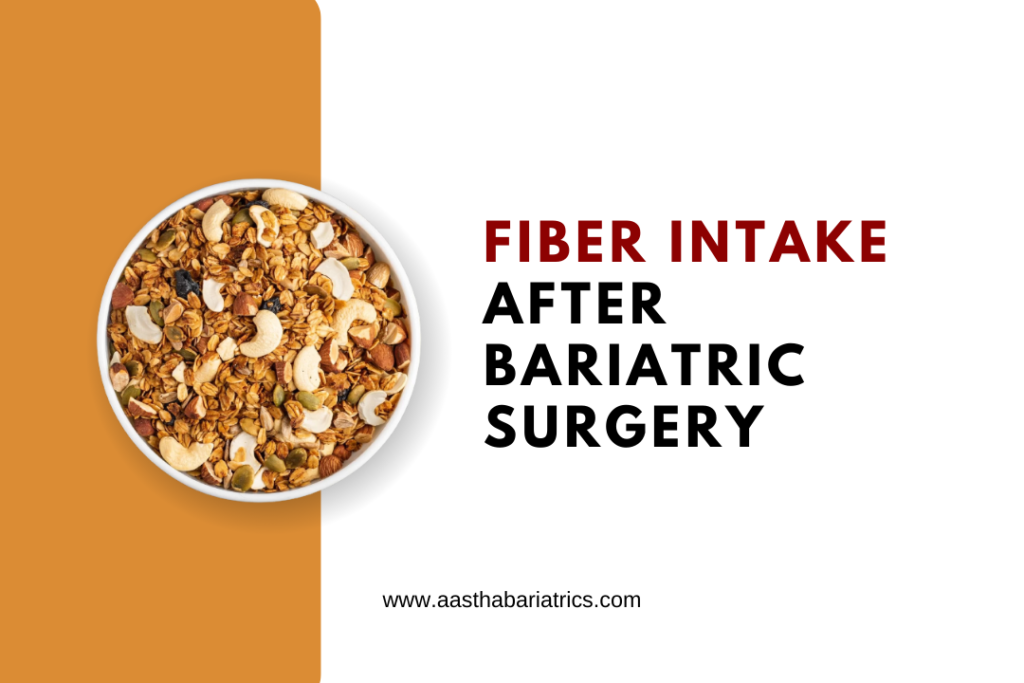
Amin Nikita
Bariatric Dietician & Content Writer

Fiber Intake After Bariatric Surgery With (PDF)

Introduction -
Bariatric surgery, also known as weight loss surgery or obesity surgery, is a surgical procedure performed to treat obesity. It involves making changes to the digestive system to help individuals lose weight and improve their overall health.
The primary goal of bariatric surgery is to reduce the size of the stomach and alter the digestive process, thereby limiting the amount of food that can be consumed and/or the absorption of nutrients. By restricting food intake and/or altering nutrient absorption, bariatric surgery aims to promote weight loss, improve weight-related health conditions, and enhance overall quality of life.
After undergoing bariatric surgery, it’s important to follow a specific dietary plan to support your weight loss and overall health. Including fiber-rich foods in your post-bariatric surgery diet can help promote regular bowel movements, maintain satiety, and aid in digestion. Here are some types of fiber you should consider including in your diet:
1. Soluble fiber:
Soluble fiber dissolves in water and forms a gel-like substance in the digestive tract. It slows digestion, promotes satiety, and may help regulate blood sugar levels. Good sources of soluble fiber are oats, barley, legumes (beans, lentils, peas), fruits (apples, oranges, berries) and vegetables (carrots, broccoli, Brussels sprouts).
Psyllium husk:
Psyllium is a soluble dietary fiber commonly used as a dietary supplement or additive to food due to its high fiber content. It improves bowel movements and helps relieve constipation. Psyllium husk comes in powder or capsule form, but it’s important to follow the recommended dosage instructions.
2. Insoluble Fiber:
Insoluble fiber adds bulk to the stool, aiding in regular bowel movements and preventing constipation. It doesn’t dissolve in water but absorbs water in the digestive system, which helps soften the stool. Whole grains (brown rice, quinoa, whole wheat), nuts and seeds (almonds, chia seeds, flaxseeds), and vegetables (cabbage, kale, cauliflower) are good sources of insoluble fiber.
Why is fiber important after bariatric surgery?
Dietary fiber plays an important role in the post-bariatric surgery diet for several reasons:
- Promotes Satiety:
Consuming foods high in fiber can help you feel full and satisfied with smaller portions. Since bariatric surgery reduces the size of the stomach, you need to be mindful of portion sizes and ensure you`re getting adequate nutrition. Including fiber-rich foods can help you achieve satiety and avoid overeating.
- Supports Weight Loss:
High-fiber foods tend to be lower in calories and can contribute to weight loss. By incorporating fiber into your diet, you can increase the volume of food you consume without significantly increasing calorie intake. This can be particularly beneficial for individuals who have undergone procedures like gastric bypass or sleeve gastrectomy.
- Regulates bowel movements:
After bariatric surgery, some people experience changes in bowel habits, such as constipation. Fiber adds bulk and softens stools and promotes regular bowel movements. This is especially important as constipation can be common after surgery due to changes in eating habits and reduced food intake.
- Manage blood sugar levels.
Eating high-fiber foods, especially soluble fiber, slows the absorption of sugars and helps regulate blood sugar levels. This is important for people with conditions such as diabetes and insulin resistance, which are common in patients undergoing bariatric surgery.
- Supports Digestive Health:
Fiber plays an important role in maintaining a healthy digestive system. Provides fuel for beneficial gut bacteria and contributes to a balanced gut microbiome. A healthy gut microbiome leads to better digestion, nutrient absorption, and overall health.
While fiber is beneficial, it’s important to note that the type and amount of fiber you eat after bariatric surgery can vary depending on the specific procedure you’re having and your individual dietary needs. You should work with a dietitian or health care professional who specializes in bariatric surgery to determine the appropriate amount and type of fiber for your post-surgery diet.
We have one of the greatest teams of weight reduction and obesity specialists. AASTHA BARIATRICS provides excellent treatment to patients and guides them through the bariatric surgery procedure. This wellness center is dedicated to promoting the health of the community by delivering high-quality, personalized health care with compassion, decency, and respect for patients.







